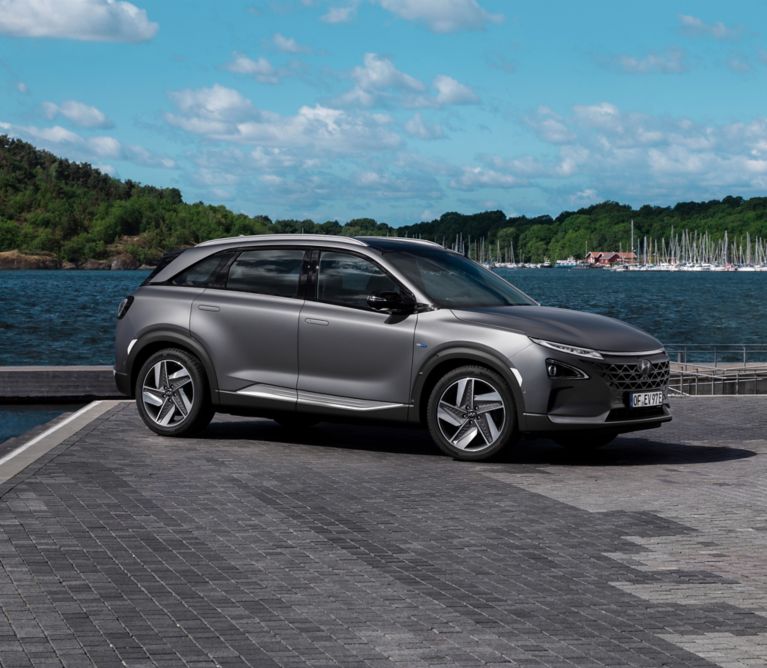- Hyundai’s second-generation fuel cell electric SUV, NEXO, met 1,000 sales milestone in the third quarter of 2021
- Announced at the recent Hydrogen Wave Forum, Hyundai is currently developing its third-generation fuel cell stack
Press material
-
Download
-
Images
European sales of Hyundai Motor’s hydrogen-powered NEXO have surpassed 1,000 units since the start of production in 2018. NEXO is the company’s second-generation fuel cell electric vehicle SUV (FCEV), following the ix35 Fuel Cell. It is produced in Ulsan, South Korea, with more than 6,000 units being manufactured annually in 2019 and 2020.
NEXO strengthens Hyundai’s long-time commitment to cleaner mobility. The company’s innovative FCEV emits only water vapour, the by-product the chemical reaction between hydrogen and oxygen which generate electricity. NEXO delivers a driving range of up to 666 kilometres, according to WLTP, as well as a refilling time of less than five minutes. This ensures customers can benefit from one of the longest fuel cell-powered capacities, as well as maximum convenience while on longer journeys.
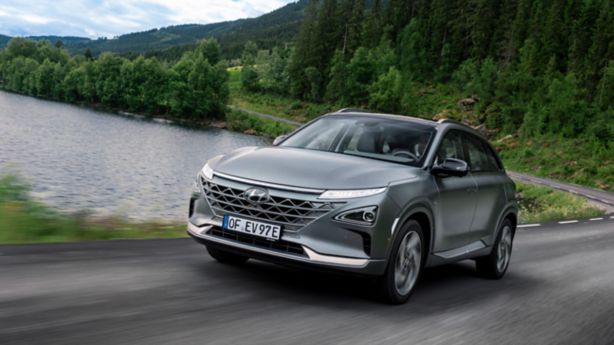
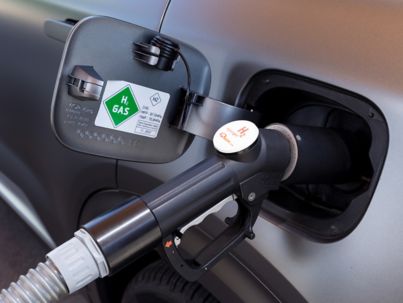
Hydrogen consumption combined for the Hyundai NEXO in kg H2/100 km: 0.95; CO2 emissions combined in g/km: 0 (WLTP)
Hyundai’s hydrogen history
Before NEXO, Hyundai had been investing in hydrogen fuel cell technology for more than two decades. The company’s fuel cell system leverages years of experience to bring FCEVs to the market. At the turn of the century, Hyundai introduced its first fuel cell electric vehicle, the SANTA FE FCEV prototype. Hyundai was the first car manufacturer to commercialise hydrogen and mass produce an FCEV with the 2013 launch of the ix35 Fuel Cell, and five years later, NEXO became the company’s second-generation FCEV.
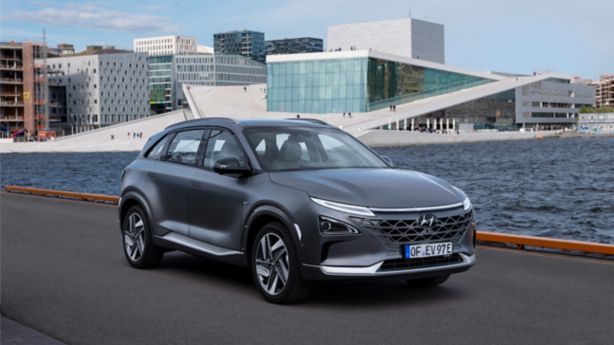
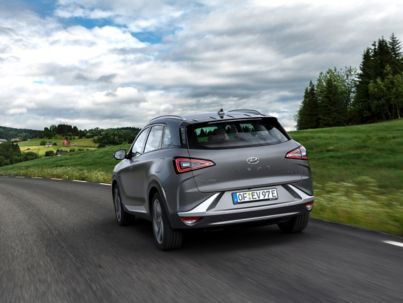
Right: Hydrogen consumption combined for the Hyundai NEXO in kg H2/100 km: 0.95; CO2 emissions combined in g/km: 0 (WLTP)
Left: Hydrogen consumption combined for the Hyundai NEXO in kg H2/100 km: 0.95; CO2 emissions combined in g/km: 0 (WLTP)
To foster a better and cleaner future, Hyundai has committed itself to develop fuel cell technology further. The company supports establishing the supply chain to make a “hydrogen economy” a reality.
Just last year, Hyundai brought the XCIENT Fuel Cell, the world’s first mass-produced, fuel cell electric heavy-duty truck, to the Swiss commercial market. As of July 2021, the XCIENT Fuel Cell fleet consisted of almost 50 trucks, and the trucks currently in operation have already driven more than 1.5 million kilometres cumulatively. The 2021 version features a 190-kW hydrogen fuel cell system with two 95 kW fuel cell stacks and a maximum driving range of around 400 kilometres.
Recently, Hyundai handed over its Elec City Fuel Cell bus to two bus operators in Munich. Its 180-kW high-capacity hydrogen fuel cell system consists of two 90-kW hydrogen fuel cells and can deliver more than 500 kilometres of driving range. The hydrogen-powered bus is now being tested in Europe.
Hyundai’s hydrogen vision
Hyundai Motor Group revealed its FCEV roadmap for the coming years at the Hydrogen Wave Forum, which followed the IAA Mobility 2021. The company is currently developing its third-generation fuel cell stack, which will replace the NEXO’s current stack. The company also revealed an innovative fuel cell ‘Full Flat System’ which has potential applications for PBVs, MPVs, buses, and trams. Hyundai expects to sell more than 110,000 passenger and commercial FCEVs globally every year by 2025.
As a global leader in developing, mass producing, and exporting hydrogen fuel cell systems, Hyundai is going to provide its fuel cell powertrain to all types of mobility fleets. Regarding the fleet of XCIENT Fuel Cell truck, Hyundai aims to provide 1,600 heavy-duty trucks to the Swiss market by 2025.
Hyundai also announced its plan to popularise hydrogen by 2040 with a new range of hydrogen-based products and technologies for a hydrogen society. On top of introducing significantly less expensive and volume reduced, next-generation fuel cell systems in 100 kW and 200 kW variations by 2023, the Group also revealed future fuel cell-powered product concepts, including a Trailer Drone, a high-performance sports car, and fuel cell-equipped vehicles for emergency relief and rescue missions.
The Group has outlined several ambitious goals. By 2028, it plans to become the first automotive manufacturer to electrify all its commercial vehicle models – either with a fuel cell system or a battery-electric powertrain. Two years later, it intends to make FCEVs available at a price point comparable to BEVs. Beyond applying fuel cell systems to all types of mobility, the Group plans to bring the technology to other aspects of society, including homes, buildings, and power stations as energy solutions.
Disclaimer: CO2 and emissions data
- Hydrogen consumption combined for the Hyundai NEXO in kg H2/100 km: 0.95; CO2 emissions combined in g/km: 0 (WLTP)

